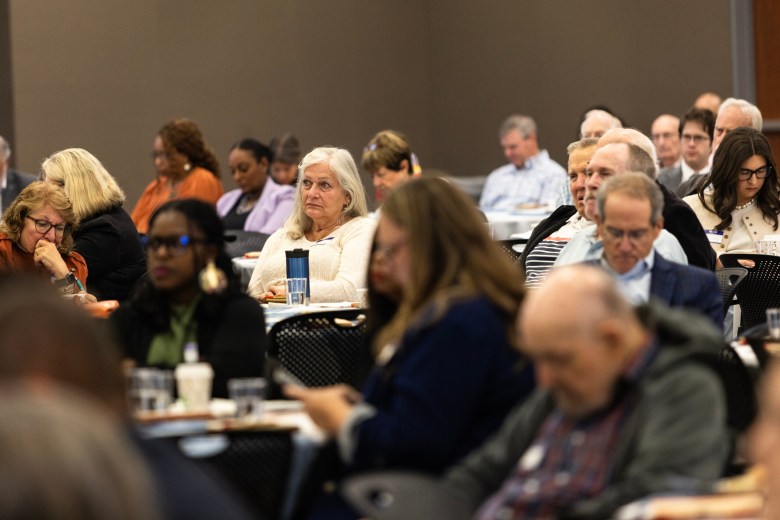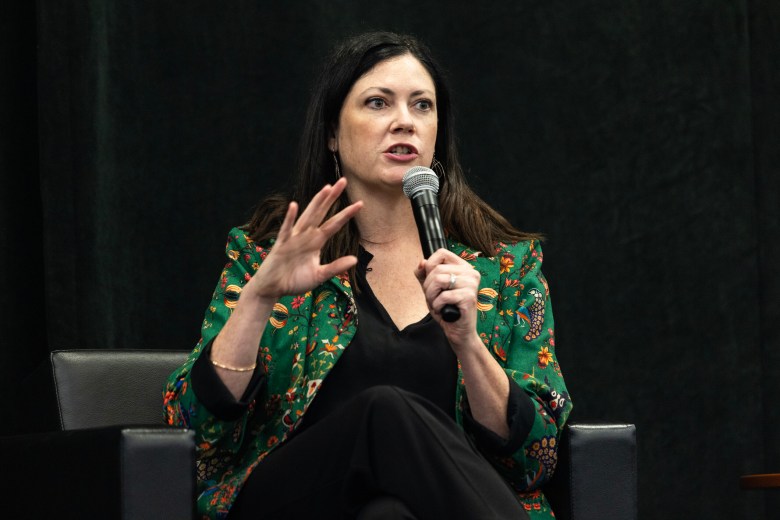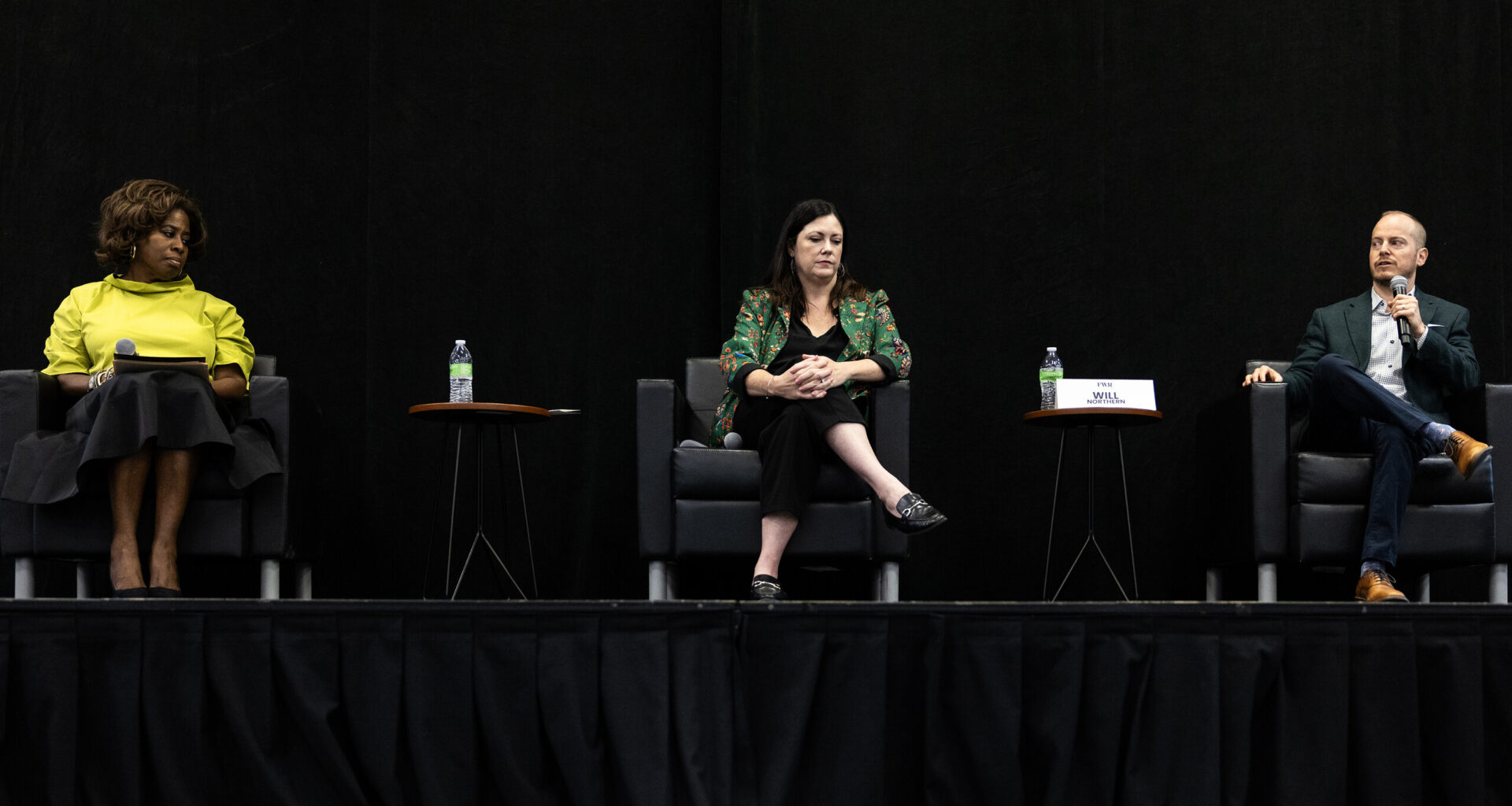The future of housing in Fort Worth is dynamic and diverse, requiring a mix of dense single-family homes, creative multifamily zoning and nonprofit investment, a panel of city stakeholders said.
Housing affordability was at the center of a discussion on Thursday during the Fort Worth Report’s 1 Million & Counting Growth Summit and Luncheon, which explored how nonprofits and developers are addressing the city’s booming growth and rapidly rising housing costs.
The panel featured Becky Bass, executive director, Fort Worth Community Land Trust; Will Northern, owner and founder of Crescendo Development; and Michelle Thomas, executive director of Global Philanthropy for JPMorgan Chase.
 Michelle Thomas speaks on a panel during a Growth Summit moderated by Bob Francis in Fort Worth on Oct. 23, 2025. (Maria Crane | Fort Worth Report/CatchLight Local/Report for America)
Michelle Thomas speaks on a panel during a Growth Summit moderated by Bob Francis in Fort Worth on Oct. 23, 2025. (Maria Crane | Fort Worth Report/CatchLight Local/Report for America)
Average home sale prices in Fort Worth have risen about 190% since 2010, according to estimates from the U.S. Department of Housing and Urban Development — a price hike due to demand outpacing housing supply, rising construction costs and inflation.
Addressing housing is vital to the city’s future, said Bass, who emphasized that Fort Worth can’t continue to bring in people to fill jobs and schools without homes they can afford.
The city has grown about 34% over the past several years — faster than Texas’ 24% growth, Bass said.
 Audience members listen to a panel at a Growth Summit moderated by Bob Francis in Fort Worth on Oct. 23, 2025. (Maria Crane | Fort Worth Report/CatchLight Local/Report for America)
Audience members listen to a panel at a Growth Summit moderated by Bob Francis in Fort Worth on Oct. 23, 2025. (Maria Crane | Fort Worth Report/CatchLight Local/Report for America)
The city’s boom necessitates denser housing, with “a blend of housing types” filling the city’s neighborhoods, Northern said. He envisions single-family homes alongside duplexes and fourplexes, similar to the city’s Near Southside neighborhood that are the result of city investments, accessible public transit and flexible zoning.
Fort Worth’s zoning categories have evolved to make it easier to create affordable housing, said Northern, a former zoning commissioner who is recently developing a mixed-use area at the former Woodhaven golf course.
As a zoning commissioner, he watched the creation of an “urban residential” flexible zoning category, which allows developers to create affordable, dense housing suited to any existing neighborhood.
“All the lots out there are not perfect little rectangles; sometimes they’re really odd shapes, and there are setbacks,” Northern said. He added that through more flexible zoning, the city can “make land that might otherwise be undevelopable, developable.”
 Will Northern sits on a panel during a Growth Summit moderated by Bob Francis in Fort Worth on Oct. 23, 2025. (Maria Crane | Fort Worth Report/CatchLight Local/Report for America)
Will Northern sits on a panel during a Growth Summit moderated by Bob Francis in Fort Worth on Oct. 23, 2025. (Maria Crane | Fort Worth Report/CatchLight Local/Report for America)
Gentrification in the city’s older neighborhoods was a top concern for Thomas. She said her parents bought their house within Fort Worth’s core for $34,000. Now, it’s worth over half a million.
The higher taxes these kinds of property values bring put pressure on older residents, many of whom are on fixed incomes.
Since 2017, the city’s average single-family home value rose from $188,536 to $305,476, according to the Tarrant Appraisal District.
Thomas said initiatives like Bass’ land trust are necessary to ensure it’s possible for people from mid-income ranges to become homeowners.
The Fort Worth Community Land Trust buys property, renovates houses as needed, then sells the homes to a qualified family making up to 120% of the area’s median income. The family owns the house, but the trust owns the land and gets first choice to buy back the residence when the family decides to move.
Since the trust keeps ownership of the land, the home prices stay attainable.
Panelists said stigmas around affordable housing and density are undeserved, and such projects garnered bad reputations because of poor management. As Fort Worth sees more multifamily and townhome initiatives, the city needs to ensure they are being operated by individuals who care about the properties and the people living in them, panelists said.
 Becky Bass speaks on a panel during a Growth Summit moderated by Bob Francis in Fort Worth on Oct. 23, 2025. (Maria Crane | Fort Worth Report/CatchLight Local/Report for America)
Becky Bass speaks on a panel during a Growth Summit moderated by Bob Francis in Fort Worth on Oct. 23, 2025. (Maria Crane | Fort Worth Report/CatchLight Local/Report for America)
Bass said more money is needed to expand Fort Worth’s housing supply in a sustainable, healthy way. She encouraged summit attendees to go to one of Fort Worth’s 2026 bond town halls and advocate for more of the $840 million bond, which voters will weigh in on next May, to go to housing investments.
Currently, affordable housing’s share of funding sits at the bottom of the city’s bond draft, designated to receive $5 million.
“We need funding sources outside of just federal resources and philanthropy,” Bass said. “It is time for us to make local contributions to our housing ecosystem and then make it easy to use those dollars.”
Drew Shaw is a government accountability reporter for the Fort Worth Report. Contact him at drew.shaw@fortworthreport.org or @shawlings601.
At the Fort Worth Report, news decisions are made independently of our board members and financial supporters. Read more about our editorial independence policy here.
Related
Fort Worth Report is certified by the Journalism Trust Initiative for adhering to standards for ethical journalism.
Republish This Story
Republishing is free for noncommercial entities. Commercial entities are prohibited without a licensing agreement. Contact us for details.

